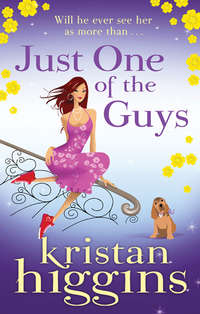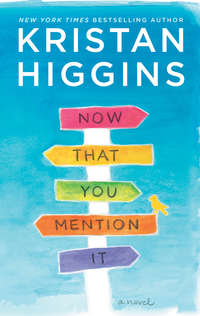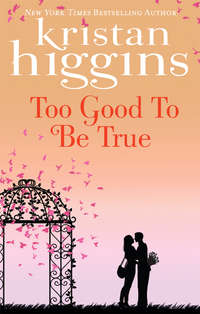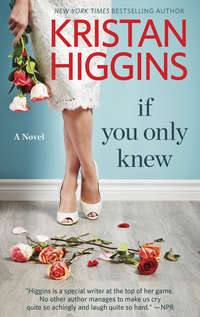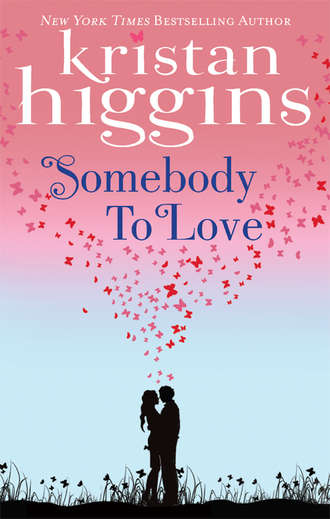
Полная версия
Somebody to Love
“Go for it,” Parker said. When he was gone again, she looked at James. “Is Harry really going to jail?” she asked, and James had to say, it wasn’t the question he imagined she’d ask.
“Yes. He went to the D.A. and confessed this morning, so that’s why it hasn’t been in the news yet. Monday morning, though…”
She gave him an odd look. “He confessed? That doesn’t seem like him.”
James looked at his hands. “Yeah.” There was that ticking noise again.
Parker sighed. “So, all this other stuff…Granddad’s boat and the paintings and Grandma’s china…it doesn’t belong to us anymore?”
He turned to face her. “Anything in this house that you personally bought stays with you—your clothes, artwork, your car, anything you bought for your son—but the rest will go to refund what Harry’s clients lost.”
“So I have no savings, no portfolio, no trust fund, and we have to move. Is that it in a nutshell?”
“Harry was able to secure another five thousand in cash for you.” James reached into his briefcase—a gift from Harry—and handed her an envelope, which she took automatically. “You have some jewelry that’s yours, right?”
“I guess so,” she said. James knew exactly what she had, as it was listed on the insurance forms. Nothing spectacular—some aging pearl necklaces, a few antique stickpins from her grandmother. All in all, maybe worth another couple grand. Parker wasn’t the type to drape herself in diamonds or redecorate or buy a sports car—she drove a Volvo Cross Country that was a good five or six years old. She didn’t even travel that much. She was more like the Welles family of yore—quieter, old-money New England wealth.
Harry was the new breed—make sure the world knew how much you had by spending every cent.
And even though she’d handed him his nuts on a platter a few years ago, he couldn’t help feeling really shitty about the whole situation. “I know this is a lot to take in,” he said gently, and she cut her eyes over to him. Yikes.
“I suppose there was no way you could’ve given me a heads-up, Thing One.”
“No. I’m sorry. Attorney-client privilege.”
“Hope that lets you sleep at night.”
“Moving on,” James continued, “you do own the house in Maine.”
“Which house in Maine?”
Rich people. Honestly. “Your great-aunt Julia Harrington left you a house when she died six years ago. Ring a bell?”
She frowned. “Oh, my gosh, right. I was just about to have Nicky when she died. Where is it? I never did make it up there.”
James kept his expression neutral. How do you forget about inheriting a house? “The house is in Gideon’s Cove,” he said, handing Parker the folder. “North of Bar Harbor.” He knew the town…or he did once. His bachelor uncle owned a bar up there, and James had spent a couple of summers with him as a teenager.
“So I could sell that, right?” Parker asked, her expression brightening a little. “Sell the house and have a nest egg?”
“You could,” James said. He didn’t know which house was hers, though he had a copy of the deed. If he remembered, Shoreline Drive had some nice places on it.
“Fine.” She was quiet for a minute. “I’ll go up there when Ethan and Lucy take Nicky on vacation, slap on some paint and get it listed with a real-estate agent.”
“Sounds like a plan,” he said. His own experience was that life was rarely that easy, but for her sake, he hoped it was.
“You reminded her about the house?” Harry asked, striding back into the room.
“Yes, sir,” he answered.
“Good. Parker, James knows the area. He’ll go with you and check out the property.” Right. She’d love that. God save him.
“He’ll go with you,” Vernon agreed.
“No, he won’t,” Parker said. “But thanks all the same, Thing One.”
“Don’t be foolish,” Harry said sharply. “You’ll need help.”
Parker turned to James, her eyes about as warm as Apollo’s. “Thing One, my father is so very kind to offer your services, but no thank you.”
“Fine,” Harry said. “Do whatever you want. You always do. We’ll be in touch.”
“Harry,” she began, standing up. There was the pinkie squeeze again. “Are you sure I can’t do anything for you?”
“I’ll be fine.” He flashed her a toothy smile that was so far from sincere it made James wince. Then Harry strode back out, looking every bit the master of Wall Street he used to be, Vernon murmuring on his heels.
And James, he well knew, was expected to follow. He stood up, then turned to Parker, who was staring at the snake. “I’m really sorry about all this, Parker,” he said. “I’ll do whatever I can to help.”
She gave him a look they must’ve taught her at her fancy prep school. I’m sorry, and you are…? “Save the ass kissing for my father, Thing One.”
Sigh. Some people never changed. “I mean it.”
“So do I.”
Okay, enough with the princess act. “I am good for some things,” he said. “As you might remember. Carpentry is one of them.”
“Really. How fascinating. Bye-bye, Thing One. And tell my father I’m not taking that snake.”
James stood there another minute, torn between guilt—his favorite pastime—the desire to help her in some way and the fact that he could see down her shirt a little bit from here. Fantastic view.
You don’t take anything seriously, do you? his father’s voice demanded in his head.
Hard to deny. “I loved the last Holy Rollers book, by the way,” he added.
“Then your IQ is even lower than I thought.”
He couldn’t help a smile. Parker looked away. “Call me and let me know what happens on Monday,” she said.
“Will do.” He picked up his briefcase and turned back to her. “See you in Maine.”
She shot him an icy look. “Not if I see you first. The gun laws are pretty clear about intruders on private property.” He said nothing. “Go, Thing One. Your master awaits.”
James obeyed. There was nothing else he could do.
For now, anyway.
CHAPTER THREE
IN THE TWO WEEKS since her father’s bombshell, Parker thought she’d done a pretty good job of holding it together. She was a mother…you don’t get to walk around cursing like Job or crying. And Lucy had been amazing that first weekend, helping her through the initial shock, going through the house, determining what could reasonably be called Parker’s as the movers tagged and wrapped her family’s belongings.
Not a lot was Parker’s outright. Her Mac, of course. A few pieces of furniture, a couple of paintings, a few little things for the house—a vase, some throw pillows, nothing tremendously valuable.
“You know I’ll help with money,” Lucy’d said at least fifteen times. “I have Jimmy’s life insurance, and—”
“I appreciate that,” Parker said. “But you know what? It’s okay. It’s shocking, sure, but Ethan’s got a nice bit tucked away for Nicky’s college, and I can flip the house in Maine and have a little money and write some more books. Or get a job doing something else.”
She smiled firmly, trying to forget that she’d A) ignored her father’s advice to major in economics and had instead double-majored in two such ridiculously unemployable fields that she actually woke up covered in a cold sweat one night—English was bad enough, but Ethics? Ethics?—and B) she hadn’t had a new idea for a book series since the hideous Holy Rollers had been conceived. It was such bad timing that she’d given the little suckers their wings and halos. She could’ve milked them forever.
But honestly, after the initial shock, it was a little hard to feel as if a great injustice had befallen her. For thirty-five years, she’d had more privilege and wealth than ninety-eight percent of the world. When she’d watched the footage of the Occupy Wall Street gang, back before she was broke, she couldn’t help thinking they had a point.
And now the point had been made. Now, she was normal. Better than normal, according to Lucy—she had a little over eleven grand in her bank account, no debt and a house on the coast of Maine. By Paris Hilton standards, she was destitute; by normal-people standards, sitting kind of pretty.
“I’m going to miss coming over here,” Lucy said as she folded a sweater. “Guess I’ll need to find another friend with a mansion.”
Parker smiled, appreciating Lucy’s attempt to keep things light, not to mention her help at packing. Lucy was very organized. “Good luck with that.”
“How does Nicky seem to be doing?”
“Well, you know how he is. One minute, he thinks it’s great that we’re moving, the next he forgets why we’re packing. I don’t think he’s really wrapped his brain around the idea that we won’t be coming back to live here. But I was thinking of moving anyway. It’s easier than explaining why my father’s in jail.”
“He told Ethan that Grandpa Harry was in a time-out.”
“Yeah, that’s how I put it. He had to go away and think about playing by the rules and being greedy.” She winced. “Nicky still took it pretty hard. But Harry’ll probably be out on good behavior and all that in a couple years.” Years. Crikey.
“And how are you doing with that, Parker? I know you and your father aren’t really close, but still.”
“Yeah. But still.” She gave Lucy a quick look. “I don’t know. I feel bad for him on the one hand. On the other, he deserved it. Then again, I’ve lived off family money all my life, and I never really looked at where it came from. So anyway, it all belongs to the Feds now.”
“It must be hard, though.”
Parker swallowed. It was hard. The people from the SEC had been here last week, and they’d let her keep a few sentimental things—a model of a duck that her grandfather had carved, the little white vase her grandmother had let her fill with flowers from the garden. “Well, I did snag a few bottles of wine from the cellar.”
“Priorities.”
“Exactly. And it was nothing really expensive.”
“So tell me about your cottage in Maine. Am I wrong to think Bush compound? Sort of like this place, but with gray shingles?”
Parker snorted. “I don’t know. I only met my great-aunt a couple of times. You know my mother, always dragging me off to a new stepfather. When we did see family, someone was always having a nervous breakdown. There were no picnics, no bonfires, no uncles who dressed up as Santa. One of my few memories of Aunt Julia is that she told me to start smoking or I’d get fat. I was probably about thirteen at the time.” She gave Lucy a rueful smile.
“Jeesh, Parks! How come you’re so normal?”
“I’m probably not,” she admitted, tossing some socks into her suitcase.
“So you barely see your relatives, but you inherit their summer homes.”
“Yes. It’s our own form of guilt and family obligation and to make up for decades of bitterness, alcoholism and neglect.”
“Weren’t you curious about the house?”
Parker shrugged. “Well, I was nine months pregnant when Julia died. Then that colic—remember? I could barely say my own name for six months. The truth is, I kind of forgot about it.” Parker zipped up a suitcase. “I did a Google search of the address, but all I got was a spot on a map; no satellite pictures available. Apparently I have a second or third cousin up there, according to my mom. I left a message on what I think is her machine.”
“Well, it’s great that you’ll have someone close by.”
“I know. I did see pictures of the town, and it’s really pretty, Luce. Like a postcard…lobster boats and pine trees. And I do know the house has a water view, so how bad can it be?”
“Right. I bet it’s beautiful.”
“So I’ll zip up there, spend a little money, flip it, zip back down here, find a place for us to live, and we should be all set before Nicky starts kindergarten.” She folded a cashmere hoodie. “It’ll be fun. It’ll be good for me.”
“And what about a new book series? Think you’ll get some writing done up there?”
The million-dollar question. “I hope so. I figured my father’s crimes would hurt sales, right? But no. The opposite, and now my publisher is all over me for another idea before the notoriety fades. Can you believe that?”
“Well, that’s good, I guess. That you’re wanted.”
“Yeah.” It was good; it was just a little disheartening to picture writing another sappy series, rather than that elusive, noble, touching Charlotte’s Web kind of masterpiece she’d been hoping to pull off. Attitude is everything, the Holy Rollers chided. “I’m really excited to get started.”
That’s better! the HRs cheered. They’d aged to about twelve and giggled a lot these days.
“So I was thinking,” Lucy said, shooting her a little smile. “No kid for three weeks…you should have a fling.”
Parker snorted.
“No, no! It’d be great! A summertime romance with some hot sailing dude or a fisherman. I’m thinking George Clooney in The Perfect Storm—”
“His character dies.”
“You can do a little swimming, eat some lobster, do whatever else they do in Maine, but live a little, Parker. Find a summer hottie and get it on, girl! What do you say?”
“I cannot believe I’m hearing this from you, of all people. Princess Purity turned pimp.”
“Listen, you’re the one who admitted to watching Neil Patrick Harris’s Emmy speech eight times.”
“I’m up to eleven, actually. And I’m convinced I could turn him straight.”
“Yeah, okay, we all have that dream. But a fling would be great, Parks! Come on. Who was the last guy you slept with, Parker?”
“No comment.”
“Oh, crikey! Was it Ethan?”
Parker winced. “Nope. No, it wasn’t.”
“It was. Oh, my gosh. Ethan, who is now married to your best friend.” Lucy grabbed another sweater and folded it. “That’s both sick and sad.”
“Please stop pimping me. It’s so unlike you.”
“Right. Remember that singles thing you made me go to last year? Who was pimping whom?”
“What’s pimping?” Nicky burst into the room.
“Yes, ladies, what is it?” Ethan asked, raising an eyebrow.
“It’s a grown-up thing,” Parker said. “It involves, um, baby making.”
“Gross,” Nicky said.
“Exactly,” Parker agreed, looking at Lucy with a smile.
Fling, Lucy mouthed.
“Daddy couldn’t find me,” Nicky said, jumping on the bed and rolling amid Parker’s clothes like a puppy. “I was in the pantry, and he couldn’t find me.”
“I didn’t know we were playing, Nick,” Ethan said. “You’re supposed to answer when I call.”
“Okay. Sorry.” Her son began trampolining on the bed. “Guess what, Mom?” Bounce! “Daddy says—” bounce “—our plane leaves—” bounce “—in four—” bounce “—more—” bounce “—hours!” He jumped off the bed with a thud. “And I might get some peanuts from the waitress.”
Parker’s throat tightened. She ran a hand through Nicky’s hair, which was still baby-soft. Don’t change too much while you’re gone. “You’ll have so much fun, sweetheart.”
“I know it. You should come, too.”
“Well, I’ll be up in Maine, so I’ll have a vacation, too. And Daddy will bring you up there when you get back. It’s really pretty. We can eat lobster. Maybe go sailing.”
“Okay. Kiss Elephant.” He held up his stuffed animal for a smooch. Parker obeyed, then gathered her son in her arms, breathing in his salty little-boy smell.
“I love you, Nicky,” she whispered.
“I love you, too, Mommy,” he said. Then he wriggled out of her arms, seeming to see her suitcases for the first time. “We won’t live here ever again?” he said, his voice quavering.
“No, honey. I’m sorry.”
“Then I want a house just like it.”
“We’ll have a smaller place. Like Daddy and Lucy’s.”
“I want this house. I’m gonna come back here and live!”
“Nicky, pal,” Ethan said, “this house is really big. It’s meant for lots and lots of people. But the new house will be yours and Mommy’s. And you can help pick it out, right, Parker?”
“Definitely.” She gave Ethan a grateful look.
“I want it to be purple.” Nick folded his arms across his chest.
“I love purple,” Parker said.
Ethan glanced at his watch and gave her an apologetic look. “We really should get going.”
This was it. Three weeks—twenty-three days, if one was counting, and Parker definitely was—without her son. She picked him up again and held him tight, relishing his strong little arms around her neck. “I love you, Nick. I’ll call you every night. And we can use Skype.”
“I’ll call you every night,” Nicky said. “And every morning. And in the daytime, too.”
“Anytime you want,” Ethan said. “Lucy, can you take Nicky down to the car?”
“You bet.” Lucy hugged Parker. “Love you.” She lowered her voice to a whisper. “Fling.”
“Sure,” Parker said. “You guys have fun, okay? It’s the trip of a lifetime.”
“Bye, Mom! Elephant says bye, too!”
“Bye, Elephant! Bye, Nicky! I love you!”
Then Lucy took Nicky by the hand and led him down the long hall. Don’t worry, Parker, chimed the Holy Rollers. No one can replace you! You’re the mom!
“Parker.” Ethan took the shirt she was folding—and folding and folding, apparently—and put it on the bed. “I know this hasn’t been easy. And you’ve been a rock. But I know it’s been…a lot.”
His eyes were so kind and nice that Parker could feel her own filling. Dang it. “It’s a little overwhelming,” she whispered.
“I know. But you’re not alone in this. I love you, Lucy loves you, you gave my parents their only grandchild, and they think you walk on water. You have all of us.” He kissed her forehead. “Especially me.”
Not for the first time, Parker wished things had been different with her and Ethan. The guy was damn near perfect. “I do know that, Ethan. And I appreciate it. Things aren’t that bad, really. It’s just been…fast. But I’ll flip the house up there and we’ll be fine.”
He looked at her another minute. “Okay.” He squeezed her shoulders and let her go. “I’ll call you when we land.”
“Thanks.”
“Have fun in Maine.”
“I will. I really will. It’ll build character.”
“You have plenty of character.” With that, he hugged her again and left. A minute later, she heard the echoing thud of the front door closing.
Alone in an eight-thousand-square-foot house.
Once, when she was seven, she’d roller-skated down the big hallways and into the vast kitchen, where Bess, the cook, had given her a slice of rhubarb pie. Most of the year, the Welles family—Althea, Harry and Parker—had lived in New York, in an apartment on the Upper East Side, but Grayhurst had always felt more like home. When she was very small, her grandfather had still been alive, and she had some cherished memories of a man with a deep voice who smelled like Wintergreen Life Savers. For a few magical weeks each summer, they’d come here and be together, Harry around for dinner, Althea making sand castles on the beach. Her three cousins, all girls, would come over to play, and they’d spy on the grown-ups, and make forts in the endless rooms of Grayhurst. Her dad had taught her to sail, and she and Althea played tennis after dinner.
But when she was ten, her parents divorced, and summer was never the same. Harry became a stranger, and Althea married Clay, the first of Parker’s stepfathers, less than a year afterward. Per court order, she’d visit Rhode Island for a week or two in the summer, sometimes foisted off on her aunts, then spending a torturous few days alone with Harry, who’d work most of the time. Then it would be off to whatever summer program was the in thing that year—a summer at sea, another at the Sorbonne, one in Scotland with other daughters of rich people. And don’t get her wrong. She’d had some great times, seen some beautiful places.
But those summers here, at Grayhurst, before she realized what kind of man her father was, before her mother had become a serial trophy wife…those summers had been the best. Her fifth birthday party had been here, and there’d been a white pony. When she was nine or so, she’d had a sleepover, and the gardener had rigged up a screen in front of the indoor pool, and Parker and five friends had bobbed around on inner tubes and watched Jaws.
And this was where she’d brought Nicky home after he was born. She’d rocked him in her grandmother’s Morelock chair and looked out at the sea. How could she not love the place where she learned how to be a mother?
Now Nicky’s beautiful room would be someone else’s. The dining room where they’d once tied a rope and played Tarzan, the topiary in the back where they’d had so many lunches, the back parlor where she and Lucy had spent many a girls’ night, laughing until they cried…all someone else’s.
Well. Self-pity wasn’t going to get her car packed up. The moving truck was coming to take her clothes and most of the stuff to storage—Nicky’s bunk bed, the big white sofa she had in her office, the collection of Holy Rollers books in their many translations. The photo albums and framed pictures of Nicky’s artwork.
All her life, Parker knew, she’d had the cushion of not just a trust fund, but the security of being a Welles of the Rhode Island Welleses. John Kennedy had once sailed his boat here and stayed for dinner, as he and her grandmother were childhood friends. E. B. White had played tennis on Grayhurst’s courts with her grandfather.
Now, for the first time, Parker was truly on her own.
It was oddly thrilling.
She’d use what she needed to spiff up the house in Maine and turn a cushy profit—what, maybe a couple hundred grand? Not bad for a woman who was broke.
And you know what else? Maybe Lucy was right. Lady Land had been long ignored. Maybe a little summer romance would be a good thing. Heck yeah! She had twenty-three days on her own. Might as well live a little.
But now, she’d go downstairs, uncork a bottle of her father’s cheapest. She’d take it out onto the back terrace and enjoy Grayhurst’s view for the last time. And maybe, since no one else was around, she’d have a good cry. And skate down the halls one more time.
CHAPTER FOUR
AFTER EIGHT HOURS in the car, Parker finally saw what she was looking for: a white sign surrounded by pansies and the words Welcome to Gideon’s Cove, Population 1,411. “Finally,” she muttered, slowing the car. Maine was flipping enormous, and one didn’t really understand how enormous until one had to drive the entire length of the thing. But she was here at last. Hopefully, in a few moments, she’d be opening the door of her inheritance, pouring a glass of wine and running a hot bath. You deserve it! cheeped the female Holy Rollers, who were much more in tune with this kind of thing than the boys.
“You said it, sisters,” Parker muttered. She’d been talking to them the entire drive. Just one more reason to be grateful she was here.
The downtown of Gideon’s Cove consisted of a tiny library, two churches, a town hall and about four storefronts. A bar with a neon Bud sign in the window. There was a cheerful little diner; it seemed to be the only restaurant in town. Parker grimaced. It was cute, but not exactly a tourist mecca—no T-shirt stores, no ice-cream shop, no fried-clam shack. How robust could the real-estate market be in a town with 1,400 people?
The road ended at the harbor parking lot. Parker pulled into a space and looked out at the view. Okay, yes, it was beautiful here. The cove was edged with a ragged line of gray rock and pine trees, the water a deep cobalt accented by choppy waves. A small fleet of lobster boats—six or eight of them—bobbed in the darkening blue of the evening. Beyond the cove was the Atlantic, and clouds tinged with pink and lavender rested on the horizon.
Gorgeous. And somewhere close by was her house.
The Harringtons had been wealthy, too—not like the Welles family, but sedately comfortable. Althea had gone to Bryn Mawr and grew up in Westchester; Aunt Julia had been from the Boston side of the family, and had lived in a musty but respectable town house. Parker had only visited a few times, so her memory was dim. A house on the coast of Maine…surely it had potential.




